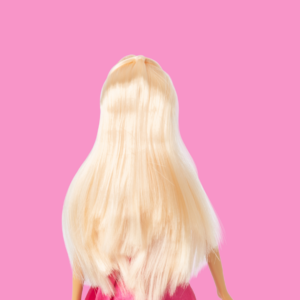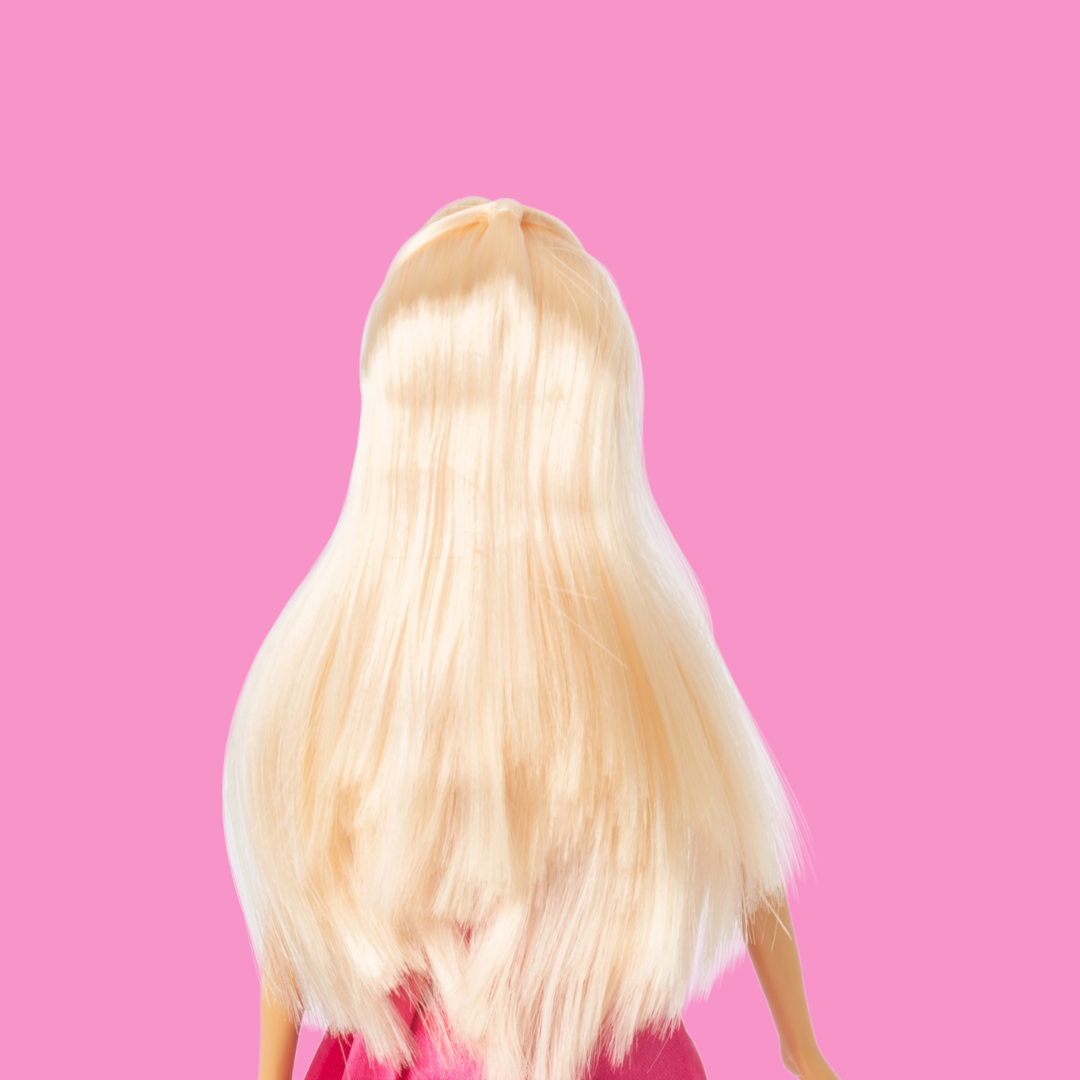Katie Blackmon.
*This review contains spoilers for the Barbie film.*

Firstly, let me say up front that I loved the film. It was bright, refreshing, strange, cathartic and a thousand other pink things. I expected to find it extremely funny and I wasn’t disappointed there. I also expected to be moved or become emotional at some point and I absolutely did. What is interesting to me is that I hadn’t read anything about the film and I’d only watched very limited trailers. Yet, I knew in my gut that at some point I would be overwhelmed by emotion. I could feel the female grief coming for me well before the box office opened.
Secondly, I have seen many men discussing this film across every media platform available to them and just as many women up in arms about them having a voice about the film. They say that men do not have a right to speak about Barbie’s thematic scope, purely because they are male and therefore shouldn’t speak about womanhood. I am not one of those voices. Any work, art or creative expression that engages widespread conversation is to be encouraged. I do not agree with every comment I have read concerning the themes in Barbie but I do not have to. So, this is my little platform of opinion, how I experienced the film and everyone is readily free to agree or disagree with me.
Margot Robbie and Ryan Gosling did a fantastic job. Not only from a comedy perspective (mainly Gosling) but where the film demanded depth of emotion and subtlety, Robbie handled all those moments beautifully. If cinema goers expected only Oppenheimer to contain any semblance of ‘real’ acting this month, they were categorically wrong. Much has been said about the casting of this film, that the choice of protagonists were surprising or inappropriate. Gosling is 42 and Robbie 33, an instant eye-roll Hollywood age gap. However, I would argue that 10 years ago casting for Barbie would have had a glass ceiling of 25 and under, so maybe we should be thankful that an actress in her 30’s even got a chance! Gosling’s comedic skill, paired with his singing and dancing prowess, did make him the perfect choice; I’d forgotten about La La Land completely until I saw his rendition of ‘Just Ken.’ (A definite highlight.)
The first act is a delightful romp through the rules of Greta Gerwig’s world building, peppered with humour and warmth. There are clever call backs to Barbie ‘lore’ which are charming yet tongue in cheek and you get the sense that this film knows exactly what it’s doing in regards to tone. Once the premise is set up, Barbie is off to the ‘real world’ to discover why she is changing and having strange, intrusive thoughts. And so we find my first emotional reaction…
Barbie and Ken find themselves roller-skating in neon lycra along a beach front and their figures both evoke strong reactions from passers-by. Ken instantly feels seen and recognised for the very first time. He stands a little taller, smiles and looks around his new surroundings with confidence. Barbie on the other hand instantly detects, “undertones of violence.” When she said this line, I went cold. I am a person who is hypervigilant when out and about as a general rule so any shift in atmosphere usually affects me straight away. As little girls we are taught to be careful in public, wary of strange men and never to walk alone at night. As grown women, we still feel “undertones of violence” regularly, even in broad daylight on busy streets, but the truth is … we get used to it. Which is in itself terrifying. Barbie then gets roughly slapped on the bottom by a leering guy who is passing her. Her instinct is to squeal, wheel round and punch him square in the jaw. Anyone who has ever experienced sexual assault, for that is what this is, can empathise with her shocked, defensive reaction. The film then cuts to Barbie and Ken getting “written up” for violence at the local police station. This is portrayed against a light-hearted, aren’t they silly, backdrop – but the subtext rings clear as a bell. A woman is sexually assaulted in broad daylight, in front of witnesses, with her male companion watching, and the conclusion in 2023 America is that this was very much her own fault.
As the film progresses, Barbie is further disillusioned with our world and overwhelmed by how complicated emotion is. She sees pain, love, joy and shame all in the space of a few moments and comments to an elderly lady (played by award-winning costume designer, Ann Roth) that she is “so beautiful.” Roth responds, “I know it.” The women beam at each other and I felt my insides warm at this lovely interaction without being fully able to pinpoint why. Maybe I felt this comment hitting home about humanity itself – messy yet beautiful.
Barbie returns to Barbie land, alongside the mother and daughter duo who have played with her over the years, to find that the Kens have mutinied against her and the ‘patriarchy’ is now in charge. The other Barbies are happy to become submissive shells of their former selves and the only way to snap them out of it is to point out the contradiction of what a woman is expected to be and to do. Gloria, played by America Ferrera, gives a speech that is now everywhere on social media and forms the heart of the film’s message. It is ‘impossible’ to be a woman. The line that stood out for me was,
“We have to always be extraordinary, but somehow we’re always doing it wrong.” (Barbie2023)
I really felt the meaning of this. Women are described using extreme vocabulary in every space. “She’s an angel, she’s incredible, she’s completely selfless…she’s a b*tch, she’s horrendous, she’s a complete diva.” Then I think about how we describe the average man – “Ken? Yeah, he’s nice, Ken’s a good guy.” I have never heard a woman described like this. “Katie? Yeah, she’s nice. She’s a good lady.” Why can’t women have normal reputations? It is exhausting striving for extraordinary when you’re just eating Cheerios and making a packed lunch for a 6 year old. It’s impossible.
The film concludes with the patriarchy being reversed in Barbie land, (my favourite line from Ken – “Once I realised the patriarchy wasn’t about horses, I lost interest”) and the Kens realising that they have to find their identity separate to their Barbies. Barbie opts for humanity and joins the real world with her new friends, Gloria and family. The lack of romance was very refreshing – Ken needs to stand alone, as do all the Kens, and make their own choices. The sisterhood and brotherhood is not often portrayed on screen in such a way that can make romantic attachment irrelevant, so this is to be applauded. However, the lack of union between the Barbies and Kens leaves a jarring, slightly unsettling tone as the film draws to a close. I didn’t feel that gender balance or equality was the goal in Barbie land. They simply returned to their female dominated infrastructure and the Kens were still very much vapid and superfluous, like little children with no purpose.
Overall, Barbie was everything it promised to be and more. Interestingly, for me, this is not a comfort film that I will return to again and again. It is a thought-provoking, emotionally charged commentary on being a woman, which I do think deserves the world-wide acclaim it is now receiving.
No matter how you feel about the film, (or Barbie) the conversations that it opens up are important ones, which I hope will not get side-lined too quickly or swept under the proverbial pink carpet. I encourage you to discuss the film with someone older and younger than you – it’s quite surprising how their perspectives may differ.
(And yes, I did have a Barbie as a little girl .. but if I’m honest, I preferred my Sindy doll.)

